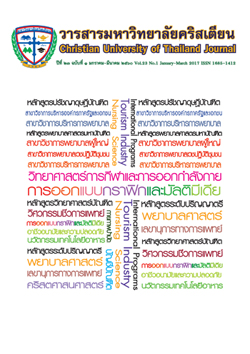ความสามารถในการบริหารเวลา : กรณีศึกษาพนักงานในโรงงานอุตสาหกรรมที่เป็นลูกค้าของบริษัท กัลฟ์ โคเจนเนอเรชั่น จำกัด
บทคัดย่อ
งานวิจัยนี้มีวัตถุประสงค์เพื่อศึกษาความสามารถในการบริหารเวลาของพนักงานในโรงงานอุตสาหกรรม ซึ่งเป็นลูกค้าของบริษัท กัลฟ์ โคเจนเนอเรชั่น จำกัด จังหวัดสระบุรี ประเทศไทย โดยรวมและเป็นรายด้าน 6 ด้าน ได้แก่ 1) การวิเคราะห์ปัญหาที่เกี่ยวข้องกับการใช้เวลา 2) การกำหนดวัตถุประสงค์ที่สอดคล้องกับความเป็นจริง 3) การวางแผนการใช้เวลา 4) การดำเนินการตามแผน 5) การประเมินผลการใช้เวลา 6) การปรับปรุงแผนการใช้เวลาและปรับปรุงกิจกรรมที่ทำให้เสียเวลา กลุ่มตัวอย่างในการศึกษาครั้งนี้ประกอบได้ด้วย พนักงาน 53 คน จากโรงงานอุตสาหกรรม อำเภอแก่งคอย จังหวัดสระบุรี แบบสอบถามที่ใช้ประกอบด้วยจำนวน 56 ข้อ สถิติที่ใช้ในการวิเคราะห์ข้อมูล ได้แก่ ค่าเฉลี่ยเลขคณิต ส่วนเบี่ยงเบนมาตรฐาน การทดสอบค่าที การวิเคราะห์ความแปรปรวน แบบทางเดียวและการวิเคราะห์ความแตกต่างรายคู่ด้วยวิธี ของเชฟเฟ่ งานวิจัยนี้ได้เปรียบเทียบความสามารถในการบริหารเวลาของพนักงานจำแนกตามตัวแปร เพศ อายุ ระดับการศึกษา และรายได้ ผลการศึกษาพบว่าพนักงานที่เป็น ลูกค้าของบริษัท กัลฟ์ โคเจนเนอเรชั่น จำกัด มีความสามารถในการบริหารเวลาในระดับสูง 3 ด้าน ได้แก่ 1) การบริหารจัดการเวลาโดยรวม 2) การวางแผนการใช้เวลา 3) การประเมินผลการใช้เวลา พนักงานเพศชายและเพศหญิงมีความสามารถในการบริหารเวลาโดยรวมแตกต่างอย่างมีนัยสำคัญ อย่างไรก็ตามไม่มีความแตกต่างอย่างมีนัยสำคัญในการบริหารเวลารายด้านและโดยรวมระหว่าง พนักงานที่ แตกต่างกันทางด้านอายุ ระดับการศึกษาและรายได้ ผู้วิจัยมีข้อเสนอแนะในการนำผลการวิจัยไปใช้ในการปรับปรุงการบริหารเวลาของพนักงานในโรงงานอุตสาหกรรมให้ดีขึ้น โดยเฉพาะอย่างยิ่งการพัฒนาทักษะด้านการกำหนดเป้าหมายการดำเนินชีวิต ด้านการดำเนินการตามแผนที่วาง ไว้ และด้านการปรับปรุงแผนการใช้เวลาและแก้ไขกิจกรรมที่ทำให้เสียเวลา
เอกสารอ้างอิง
Arnold, E., & Pulich, M. (2004). "Improving productivity through more effective time management". The Health Care Manager. 23(1) : 65-70.
Barsan, V., Bondera, I., Miricescu, D., & Roca, R. (2014). "Time and chaos management: The need for better time managing systems". Revista Academiei Fortelor Terestre. 19(1) : 64-70.
Cemaloglu, N. & Filiz, S. (2010). "The relation between time management skills and academic achievement of potential teachers". Educational Research Quarterly. 33(4) : 3-23.
Dean, S. G., Smith, J. A., Payne, S., & Weinman, J. (2005). "Managing time: An interpretive phenomenological analysis of patients' and physiotherapists' perception of adherence to therapeutic exercise for low back pain". Disability and Rehabilitation. 27(11) : 625-636.
Drucker, P. (1966). The effective executive. New York, NY: Harper & Row.
Green, P., & Skinner, D. (2005). "Does time management training work? An evaluation". International Journal of Training & Development. 9(2): 124-139.
Harung, H. S. (1998). "Reflections". Journal of Managerial Psychology. (13): 406-449.
Hart-Hester, S. (2003). "Time managers: Secrets of effective leaders". Internet Journal of Emergency & Intensive Care Medicine. 7(1).
Kerzner, H. (1992). Project management: A systems approach to planning, scheduling, and controlling. (4th ed.). New York: Van Nostrand Reinhold Company.
Koch, C. J., & Kleinmann, M. (2002). "A stitch in time saves nine: Behavioral decision making explanations for time management problems". European Journal of Work and Organizational Psychology. (11) : 199-217.
Lakein, A. (1973). How to get control of your time and your life. New York, NY: Penguin.
Li, W.K., & Hung, K. (1997). "Consumption of discretionary time: An exploratory study". Advances in Consumer Research. (24) : 542-550.
Lokam, P. (2007). Time Management Capabilities of Undergraduate Students at Srinakharinwirot University. Unpublished Masters Dissertation, Srinakharinwirot University, Bangkok, Thailand. [Online]. Retrieved from https://thesis.swu.ac.th/swuthesis/Hi_Ed/Pim_L.pdf
Lokavit, K. (2008). Time Management Ability of Nursing Students In Pathumthani University. Unpublished Masters Dissertation, Pathumthani University, Pathumthani, Thailand. [Online]. Retrieved from https://www.ptu.ac.th/th/research/R51/Kittimaporn%2051.pdf
Macan, T. H., Shahani, C., Dipboye, R. L., & Phillips, A. P. (1990). "College students' time management: Correlations with academic performance and stress". Journal of Educational Psychology. (82) : 760-768.
Mackenzie, R. A., & Taylor, J. (1986). "Time is money, so use it productively". ABA Banking Journal. 78(4) : 130-132.
Mackenzie, R. A. & Nickerson, P. (2009). The Time Trap. (4thed.). New York: AMACOM.
Mumford, M. D., Schultz, R. A., & Van Doorn, J. R. (2001). "Performance in planning: Processes, requirements, and errors". Review of General Psychology. 5(3) : 213-240.
Naglieri, J. A., & Rojahn, J. (2001). "Gender Differences in Planning, Attention, Simultaneous, and Successive (PASS) Cognitive Processes and Achievement". Journal of Educational Psychology. (93) : 430-437.
Nandhakumar, J. & Jones, M. (2001). "Accounting for time: managing time in project-based teamworking". Accounting, Organizations and Society.26(3) : 193-214.
Osnowitz, D. (2005). "Managing time in domestic space: Home-based contractors and household work". Gender and Society. 19(1) : 83-103.
Pollock, K. & Grime, J. (2003). "GP's perspectives on managing time in consultations with patients suffering from depression: a qualitative study". Family Practice. 20(3) : 262-269.
Pomsuwan, S. (2006). "A Study of Individual and Managerial Effectiveness: A Case of Employees of the Thai Life Assurance Association". Journal of Public and Private Management. 13(1) : 35-50.
Sarp, N., Yarpuzlu, A.A., & Mostame, F. (2005). "Assessment of time management attitudes among health managers". The Health Care Manager. 24(3) : 228-232.
Spidal, D. (2009). "Time management". Key Words. 17(1) : 15-31.
Tyler, K. (2003). "Beat the clock". HR Magazine. 48(11) : 103-105.
Wang, W.C., Kao, C.H., Huan, T.C., & Wu, C.C. (2011). "Free time management contributes to better quality of life: A study of undergraduate students in Taiwan". Journal of Happiness Studies. 12(4) : 561-573.
Wedchayanon, N. (2002). Thai Style of Human Resource Management. Bangkok: National Institute of Development Administration.
Worthley, R., MacNab, B., Brislin, R., Ito, K., & Rose, E.L. (2009). "Workforce motivation in Japan : an examination of gender differences and management perceptions". The Interna tional Journal of Human Resource Management. 20(7) : 1503-1520.
Zimbardo, P. G., & Boyd, J. N. (1999). "Putting time in perspective : A valid, reliable individual differences metric". Journal of Personality and Social Psychology. (77) : 1271-1288.



